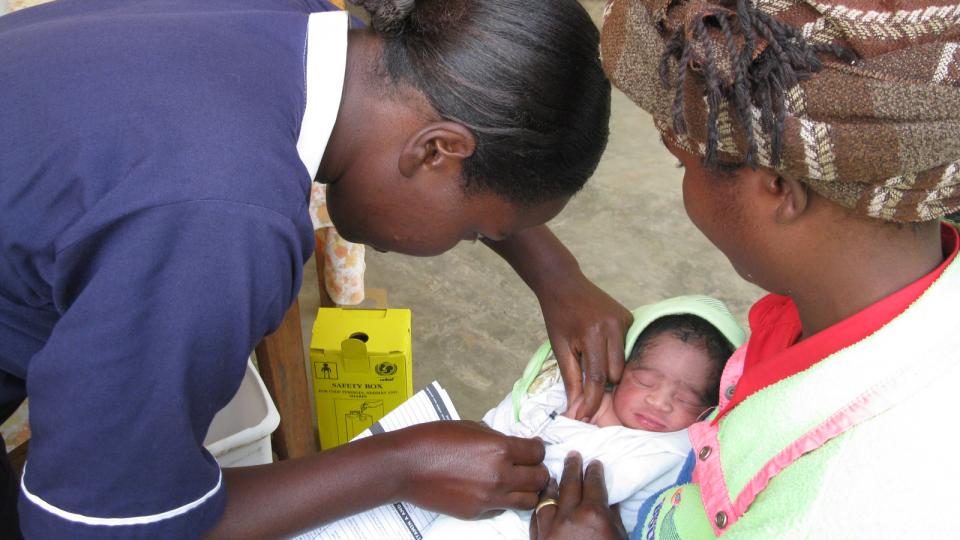Nursing school helps indigenous community survive in Uganda

A nurse immunizes a child at Bwindi Community Hospital in southwest Uganda.
Photo Credit: Courtesy of Bwindi Community Hospital
For thousands of years, the Batwa Pygmies lived among the silverback mountain gorillas in the Bwindi Impenetrable Forest of southwest Uganda.
But in 1992, the forest was declared a World Heritage Site to protect the endangered silverback, and the Batwa lost their home.
Forced to transition from hunter-gatherers to farmers, they did not adapt well, and their very survival was threatened.
Over the years, Rotary members in the United States, Uganda, and other parts of the world helped with efforts to aid the Batwa. Most recently, those efforts have focused on the creation of a nursing school to serve the entire southwestern part of the country.
Dr. Scott Kellermann, a physician and Rotary member from California, USA, discovered the plight of the Batwa in 2000, when he and his wife, Carol, traveled to the area as medical missionaries to assess the indigenous people's needs. He describes the situation they found: "Abject poverty. No access to health care, no access to education, no clean water, no sanitation, land insecurity, and food insecurity."
The Kellermanns' survey found that 38 percent of the Batwa died before the age of five -- twice the rate of Uganda as a whole -- and that the average life expectancy was 28.
Building a hospital
Shortly after his first visit, Kellermann and his wife sold their possessions, including his medical practice, and moved to Uganda -- where they stayed fulltime until 2009 -- to help the Batwa. Starting with mobile clinics held under trees and with IVs hanging from branches, they treated "200, 300, sometimes 500 people a day," Kellermann recalls. Eventually, they launched a foundation and built Bwindi Community Hospital.
Kellermann's Rotary connections helped to equip it. Projects supported by a series of Rotary Foundation grants and backed by members in Uganda, the United States, and other parts of the world provided an operating theater, a dental unit, generators, solar panels, and clean water and improved sanitation, and taught the Batwa how to raise small livestock to improve their nutrition.
Now, the infant mortality rate is down to 6 percent, and the number of women dying in childbirth has declined 60 percent.
"Rotary has been incredible," says Kellermann. "It doesn't just throw money at a problem. It goes through a local Rotary club so Rotarians on the ground come out to make sure the projects are successful. What Rotary did was look at the broader picture and say, hey, a hospital is great. But you need to prevent these diseases. You need to provide water and sanitation. You need to teach these women how to feed their kids." A project aimed at reducing the incidence of malaria distributed thousands of bed nets to families through tribal healers. "In 2006, we were losing one to two kids every week to malaria," Kellermann says. "After Rotary helped us distribute 25,000 bed nets, we went nine months without a kid dying from malaria. Rates have dropped over 90 percent."
Creating a nursing school
A few years ago, two entrepreneurs, James Jameson and Steve Wolf, met Kellermann while they were in the area to track gorilla. After they learned of the need for a nursing school, they contributed more than $650,000 to plan, design, and build it. The Uganda Nursing School Bwindi opened in November 2013. The pair also paid to send Jane Anyango, a registered nurse at the Bwindi hospital, to Queen Margaret University in Edinburgh, Scotland, where she earned a master's degree in nursing that enabled her to take over as the school's principal teaching tutor. And they provided iPads, loaded with a year's worth of textbooks, for every nursing student at the new school.
Last year, Jerry Hall, a past Rotary International vice president, led a vocational training team of nursing educators who spent two weeks developing the school's curriculum, instruction, and administration. Hall had met Kellermann during a previous project, when Hall was a Rotary director, and he had become a strategic planning consultant for the hospital.
Hall's club, the Rotary Club of Reno, Nevada, USA, along with Rotary members in Kihihi, Uganda, and 18 other clubs, raised $67,000 for a global grant totaling $247,000 that provided furnishings, classroom supplies, and lab equipment for the school.
Hall says that after the vocational training team returned home, a team member affiliated with the University of San Francisco arranged for Anyango to have access to the university's trove of digital information. Another team member arranged to have flash drives loaded with nursing curriculum sent to the school.
"The technology they have at the school is the first of its kind in Uganda," says Hall. "The chair of the Uganda Nursing Council attended a grand opening celebration during our stay and was blown away by some of it.
"The potential is tremendous," adds Hall. "Once we get trained nurses out to the villages and regional areas, you'll have people with midwifery skills who can deliver children out there safely and provide prenatal care. None of that is available today."
By Arnold R. Grahl
Rotary News
Rotary News